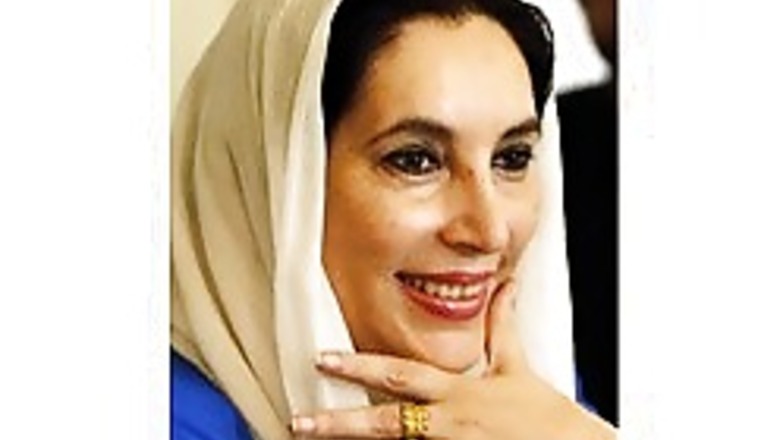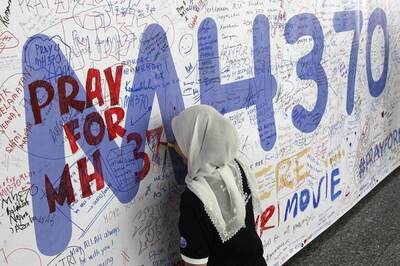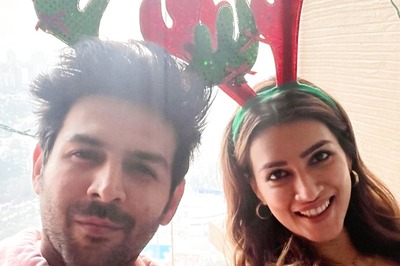
views
New Delhi Benazir Bhutto was the first female prime minister of Pakistan and of an Islamic nation in modern history. She was elected PM in 1988. She returned to Pakistan in 2007 to contest in parliamentary elections, but was killed at a suicide attack at her rally in Rawalpindi on December 27, 2007.
April 4, 1979: Benazir Bhutto's father, former prime minister Zulfikar Ali Bhutto, is executed by military dictator Zia-ul-Haq. Bhutto allowed to leave for England in 1984 after three-years of imprisonment.
April 1986: Bhutto arrives in Lahore from exile to a rapturous welcome by millions of supporters to lead the Pakistan People's Party against Zia-ul-Haq.
November 16, 1988: Zia-ul-Haq killed in an air crash. The PPP wins in the ensuing general elections
December 2, 1988: Bhutto sworn in as Pakistan's first woman prime minister.
August 1990: Bhutto was dismissed by president Ghulam Ishaq Khan on charges of corruption and misrule. Her husband Asif Zardari arrested on kidnapping charges.
October 1990: PPP loses in the general elections and sits in Opposition for three years while Nawaz Sharif becomes prime minister.
October 1993: PPP returns to power and Bhutto is re-elected prime minister for a second term.
October 1996: President Farooq Ahmed Leghari sacks Bhutto on charges of corruption and abuse of power. Zardari arrested once again and imprisoned on a range of corruption and criminal charges.
April 1999: A Pakistani court convicts Bhutto and Zardari of receiving kickbacks worth millions of dollars for awarding a contract to two Swiss firms during her 1993-96 rule. The conviction is overturned two years later.
April 1999: Bhutto goes into self-imposed exile in London and Dubai, vowing to return to Pakistan and contest elections in 2002.
October 12, 1999: Army chief Musharraf overthrows Prime Minister Nawaz Sharif in a coup after Sharif tries to sack him.
July 2002: Musharraf issues a decree barring former premiers who have served two terms from serving a third, widely viewed as targeting Bhutto and Sharif.
October 10, 2002: Nationwide polls are held without Bhutto who is warned that she will be jailed if she returns. The PPP wins 80 of the 342 National Assembly seats.
July 2003: A Swiss court finds Bhutto and Zardari guilty of laundering US $12 million through Swiss bank accounts and hands them a six-month suspended jail term. The sentence is later overturned on appeal.
November 2004: Zardari is released from prison after serving eight years on corruption charges and reunites with Bhutto in exile.
January 2006: Interpol issues international notices following a request by Pakistan for the arrest of Bhutto and Zardari on corruption charges.
March 26, 2007: First joint protests organised by the parties of exiled former prime ministers Benazir Bhutto and Nawaz Sharif.
July 3-13, 2007: Pakistani troops besiege and storm the radical Red Mosque in Islamabad, killing at least 100 people. Bhutto praises the operation, sparking outrage among hardliners. A suicide bomber later attacks her party headquarters, killing 15 people.
September 2007: Musharraf and Bhutto aides step up talks in London and Dubai over a power-sharing pact.
September 14, 2007: PPP announces that Bhutto will return on October 18.
October 4, 2007: Bhutto and Musharraf agree on a national reconciliation accord. Musharraf signs deal for an amnesty which clears Bhutto of graft charges.
October 6, 2007: Musharraf wins presidential election.
October 13, 2007: The government urges Bhutto to delay her return until a court rules whether the amnesty deal is legal.
October 17, 2007: At a press conference in Dubai, Bhutto confirms she will return as planned, saying "Pakistan's future is at stake."
October 18, 2007: Bhutto returns to Karachi from Dubai after eight years in self-exile. Two suicide bombers attack her homecoming parade hours later, killing nearly 160 people.
October 31, 2007: Bhutto says she has heard rumours Musharraf will impose a state of Emergency and postpones planned trip to Dubai. She flies to Dubai the following day.
November 17, 2007: Musharraf imposes state of emergency, suspends the constitution and arrests key opposition figures, citing Islamic extremism and judicial interference.

















Comments
0 comment